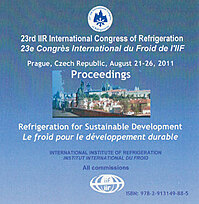
Document IIF
Un algorithme d'optimisation par essaims particulaires pour déterminer le fonctionnement optimal des refroidisseurs multiples.
A PSO algorithm for optimal multiple chiller operation.
Numéro : pap. ID: 483
Auteurs : BEGHI A., CECCHINATO L., COSI G., et al.
Résumé
The problem of efficiently managing multiple chiller systems is complex in many respects. In particular, the electrical energy consumption in a plant of medium-high cooling capacity markedly increases if the machines are not properly managed. Therefore significant energy savings can be achieved by optimizing the chiller operations in Heating, Ventilation and Air Conditioning (HVAC) plants. In this paper an unified method for efficient management of multiple chiller systems, by means of a Particle Swarm Optimization (PSO) based algorithm, is presented. In particular, the results show that it is possible to achieve substantial energy savings while granting good load profile tracking with respect to standard approaches. The performance of the algorithm is evaluated by resorting to the dynamic simulation environment, where the plant dynamics are accurately described. The results show that PSO satisfactorily deals with such kind of multi-objective, constrained optimization problem, while offering advantages, with respect to other optimization techniques, in terms of ease of implementation.
Documents disponibles
Format PDF
Pages : 8 p.
Disponible
Prix public
20 €
Prix membre*
Gratuit
* meilleur tarif applicable selon le type d'adhésion (voir le détail des avantages des adhésions individuelles et collectives)
Détails
- Titre original : A PSO algorithm for optimal multiple chiller operation.
- Identifiant de la fiche : 30003203
- Langues : Anglais
- Source : Proceedings of the 23rd IIR International Congress of Refrigeration: Prague, Czech Republic, August 21-26, 2011. Overarching theme: Refrigeration for Sustainable Development.
- Date d'édition : 21/08/2011
Liens
Voir d'autres communications du même compte rendu (569)
Voir le compte rendu de la conférence
Indexation
-
Method for evaluating the energy efficiency of ...
- Auteurs : WAGNER S. R., HAUSSER S., BECKER M.
- Date : 21/08/2023
- Langues : Anglais
- Source : Proceedings of the 26th IIR International Congress of Refrigeration: Paris , France, August 21-25, 2023.
- Formats : PDF
Voir la fiche
-
Process cooling CO2 chillers: field ...
- Auteurs : PISANO G.
- Date : 13/06/2022
- Langues : Anglais
- Source : 15th IIR-Gustav Lorentzen Conference on Natural Refrigerants (GL2022). Proceedings. Trondheim, Norway, June 13-15th 2022.
- Formats : PDF
Voir la fiche
-
Case study of Zielona Gora gas cogeneration pla...
- Auteurs : KARZKOWIAK K., CHOROWSKI M.
- Date : 21/08/2023
- Langues : Anglais
- Source : Proceedings of the 26th IIR International Congress of Refrigeration: Paris , France, August 21-25, 2023.
- Formats : PDF
Voir la fiche
-
Maximizing chilled water plant efficiency.
- Auteurs : HO S.
- Date : 17/03/2005
- Langues : Anglais
- Source : Systems design approach for air conditioning conference. Thinking outside the flanges.
Voir la fiche
-
Life cycle cost and climate performance of chil...
- Auteurs : LARMINAT P. de
- Date : 12/06/2015
- Langues : Anglais
- Source : Le ultime tecnologie del freddo e del condizionamento. Atti del 16° Convegno Europeo: June 12-13, 2015, Milano, Italia.
- Formats : PDF
Voir la fiche
